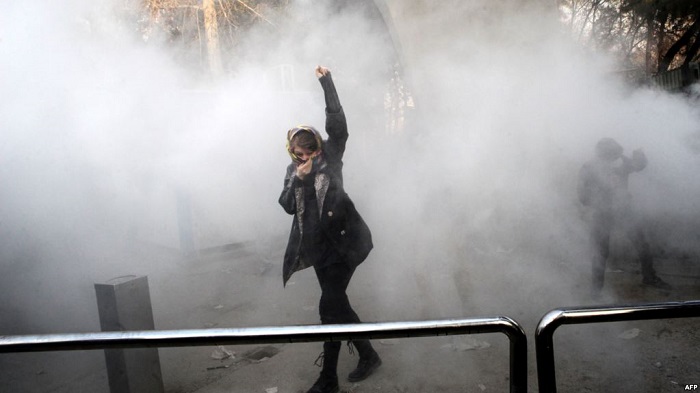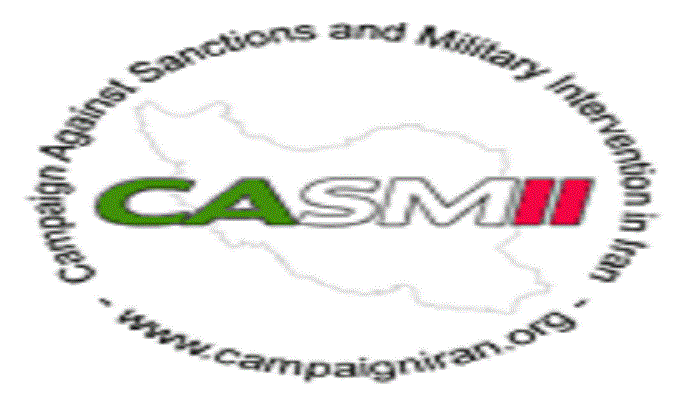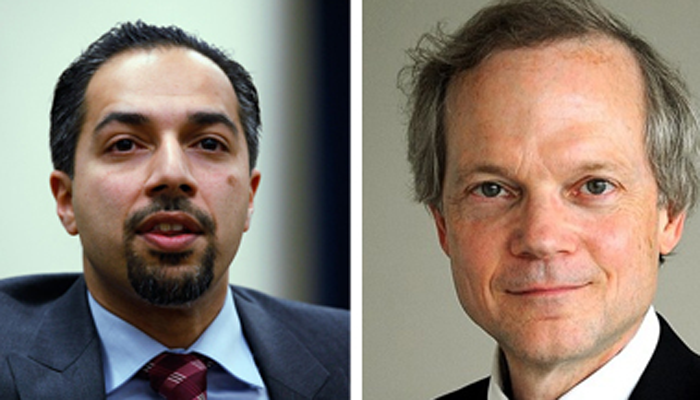
The Iran lobby has scrambled to find the right kind of response to the re-imposition of economic sanctions by the Trump administration. It has tried to shield the mullahs from any culpability for leading Iran down this path with their support for terrorism and proxy wars that have devastated the region.
It has even tried to argue that sanctions will only spur a new regional arms race as the regime is sure to race towards developing a nuclear weapon now that it is freed from the nuclear agreement’s restrictions by the U.S. withdrawal.
In each case the response from news organizations and international governments has been muted because there is no argument with the facts that the regime is brutal and at fault for virtually all of the sins President Donald Trump cited in his decision to pull out of the nuclear deal.
The only feeble response from supporters of the regime has been the whining wail that the regime was in compliance with the agreement and all of the other despicable acts the regime commits, especially against its own people, are outside of the agreement’s scope.
That technicality is at the heart of what made the nuclear so problematic in the first place and why the Iran lobby is yet again shifting its message to a new tack.
Jamal Abdi, the new president of the National Iranian American Council and chief Iran lobby cheerleader, offered in an editorial in the progressive blog Lobelog.com, that the real victims of economic sanctions were the Iranian people.
“The reality is that Trump’s pressure campaign weakens those within Iran who seek more conciliatory foreign relations and a more open political and social domestic landscape. It also empowers Tehran’s most reactionary forces,” Abdi writes.
If it is impolite to call someone an outright liar, then we would have to watch our language and simply say Abdi is being disingenuous with his comments.
The stark reality is that there was never any hope of moderation within the Iranian regime with the Obama-negotiated nuclear deal since the ruling mullahs never had any intention of loosening their grip on power.
The elimination of any potential rival candidates from presidential and parliamentary election slates following the deal ensured that, as well as historically massive crackdowns on the Iranian people, including a round up and imprisonment of any dissenting viewpoint – real or imaginary – as thousands of women, students, journalists, activists, bloggers, artists and even YouTubers ended up in Iranian prisons.
“The repressive powers in the Islamic Republic are far more threatened by Iran’s integration into the global economy than by a tit-for-tat dispute with the United States. They worry that the lifting of sanctions will undermine the monopolies established by the well connected few who are aligned with the Revolutionary Guards and other government entities. Indeed, after the nuclear deal, the Supreme Leader issued edicts against a broader opening to the United States and hardliners repeatedly warned of ‘foreign infiltration’ in order to obstruct President Hassan Rouhani’s outreach to the West,” Abdi added.
Another fabrication from him as the reality is that virtually all of the Iranian economy is controlled by the state through the family dynasties of ruling mullahs or the Revolutionary Guard Corps which controls the largest companies in the petroleum, telecommunications, banking, manufacturing, transportation and energy industries.
Integration back into the global economy was a boon for the Iranian military, allowing it to refill its coffers, depleted by the wars in Syria and Yemen, and mobilize proxy militias in Iraq and Afghanistan.
When foreign companies such as Peugeot, Total and Airbus quickly moved in to sign deals with the regime, who was getting the benefits? Certainly not the Iranian people who’s standard of living has plummeted under the mullahs’ rule.
The much-promised economic windfall promised to the Iranian people after the nuclear deal was signed never came and in response the Iranian people have chosen to risk their lives in ongoing, massive demonstrations sweeping throughout the country since last December and into a sweltering summer of discontent.
“The real threats to repressive rule in Iran are a growing middle class, an organized civil society movement, and leaders who have the political capital to push for change against entrenched elements in the system. These trends make a democratic Iran inevitable. But outsiders, often led by the United States, have taken actions to arrest these developments. They have propped up Iran’s repressive rulers with threats of war and invasion, and bailed them out by slapping sanctions and travel bans to isolate Iranians and keep them weak,” Abdi said.
This last point is the most damning by the Iran lobby since the regime has done its level best to eradicate the Iranian middle class with manipulation of its currency and restrictions that have skyrocketed inflation and pushed the rial down to near Weimar Republic levels.
The defiance of Abdi’s claims comes in the form of the protests taking place throughout Iran by the Iranian people, including his much-vaunted middle class who have been hit hard by the regime’s deep corruption in the economy.
Couple that with the oppressive human rights situation in which women have been tossed in jail for protesting hijab requirements and the feisty mood of the Iranian people can be seen almost every day on Iranian streets and in town squares and marketplaces.
What many in the Iran lobby are terrified of is that the Iranian people will indeed be able to exert enough pressure internally to force the kinds of liberalization and democratization it promised with the nuclear deal but failed to deliver.
The Financial Times editorialized the same sentiment in but only gets it half-right:
“It would, however, be far preferable if Iran moved towards a more liberal and open regime through a process of domestic reform, rather than as a result of crushing external pressure. The history of Iran and the wider Middle East gives ample warning that sudden violent changes in government have rarely led to happy outcomes — particularly when they have had external sponsors,” the FT’s editorial board said.
Iran’s mullahs are never going to give up power as a result of gentle persuasion. Only a massive build up of outrage by the Iranian people coupled by economic sanctions aimed directly at gutting the financial pipeline to the military is the only pathway to gain the internal regime change the FT describes.
The history of the Middle East tells us that change does not come easily, nor politely. It comes only through the convergence of external pressure coupled with internal reforms.
We believe that opportunity is finally coming to Iran.



